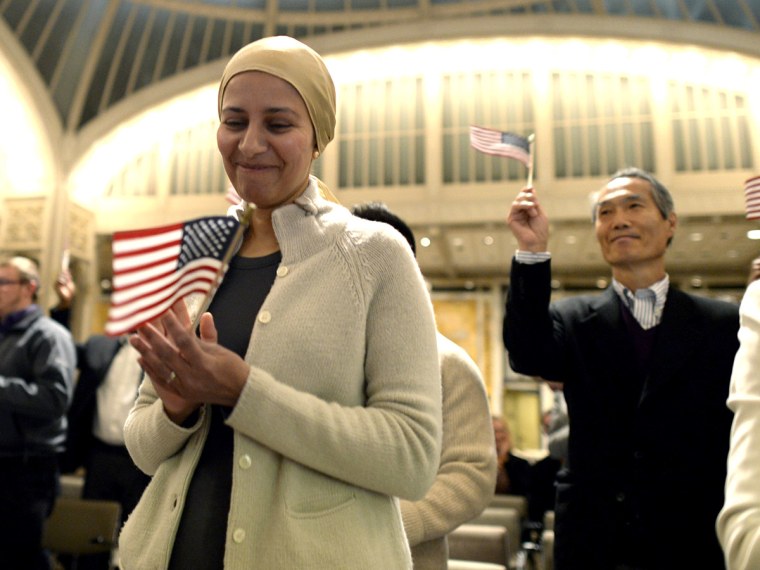It's almost invisible at this point, perceptible only through hints, trial balloons, and private exchanges between members. But it's there: immigration reform is still alive. And if you squint just right, you might spot the distant outlines of a deal.
The most visible recent news doesn't look too encouraging. Long-running talks between a bipartisan group of House members collapsed this month as two Republicans abandoned them.
But reformers are hoping that the talks' demise merely reflects the reality that House GOP leaders must ultimately decide the path forward. And on that front, there have been some encouraging signs. Most of those come from Congressman Bob Goodlatte, chair of the Judiciary committee and general GOP point man on the issue, who has said repeatedly since recess that Republicans are looking at a bill to legalize the 11 million existing undocumented immigrants and that he intends to push for votes on some immigration legislation as early as October.
"I'm happy that he says that he's moving forward, that he's looking for a bill that can go to conference," Democratic Congressman Luis Gutierrez of Illinois told reporters on Thursday. "That is a step in the right direction."
Gutierrez and another Democrat, Henry Cuellar of Texas, said they met with Goodlatte last week and were encouraged by his apparent enthusiasm for advancing immigration reform. Cuellar told reporters that Goodlatte asked for his help in selling a compromise to Democrats. But Cuellar added that he and Gutierrez have yet to hear any details about the potential breakthrough offer Goodlatte's considering.
That proposal, per Goodlatte, would go something like this. Undocumented immigrants would get permission to live and work in the country if they met certain requirements. But, except perhaps for some who arrived as children, they would neither be eligible for a special "path to citizenship" nor would they be blocked from applying for a green card and eventual citizenship through existing channels.
Immigration advocacy groups and pro-reform lawmakers have steadfastly maintained that a path to citizenship is an absolute necessity in any final bill. But many are intrigued by Goodlatte's still-vague framework.
Gutierrez and Cuellar, for example, both noted that the Senate bill, which is widely embraced by reformers, already would bar over 3 million undocumented immigrants from the legalization process. There may be some wiggle room for advocates depending on how far off Goodlatte's idea falls.
"Whatever fight we engage in today will not be the end fight," Gutierrez said when asked about the Goodlatte suggestion. "If tomorrow the president were to sign the Senate bill as it is currently constructed, we would all have a responsibility the next day to fight for those who were left out."
The trouble now is that, without an actual draft, it's impossible to gauge how appetizing Goodlatte's "no special pathway to citizenship" proposal is to Democrats and pro-immigration groups.
Right now only 5,000 low-skill visas are available to Mexican immigrants annually and family categories are backed up for years. In addition, many undocumented immigrants are married to American citizens but can't get legal status and citizenship because they're blocked by a prior deportation or illegal border crossing. Under those conditions, the number of immigrants who gain citizenship through a legalization-only scheme might be extremely low.
"The number of years it takes to get everyone through a system like that are debatable, but some say 30, 40, 50, even 60 years if you're low priority," Becky Talent, director of immigration policy at the Bipartisan Policy Center, told MSNBC.
There are more expansive routes. Many supporters of the Senate immigration bill would argue they didn't create a "special pathway" in the first place. In their case, most immigrants would go through a visa track designed for certain immigrants who have been in the country legally more than ten years. These would overwhelmingly be today's undocumented immigrants but would also include some refugees and asylum seekers who are currently enjoy some legal status. Because at least some legal immigrants have access to the path, some lawmakers argue it's not a "special" path for only former unauthorized immigrants.
More likely is an option in between. For example, the House GOP might expand the numbers of visas available while speeding up the process for millions of existing legal applicants to clear space. Another option is, like the Senate, to create a limited merit-based category that takes into account applicants' time in the country, but also a variety of other factors that could favor candidates outside the country ahead of them.
But even the most limited route to citizenship might be tempting given that it would protect millions of immigrants from removal and dramatically expand their opportunities to find work or go to school.
"If this is the way Republicans need it, they should take it because it may be years before we get back to that point," Talent said. "How many of them will be facing deportation by then?"
For any of that to happen, though, the House GOP and especially its leaders will need to finally renounce Mitt Romney's policy of encouraging "self deportation" instead of providing legal status to the undocumented. Goodlatte's willingness to speak openly about tackling the issue is the main reason reformers are a little optimistic. But it's definitely going to be a tough sell.
Republican Congressman Jason Chaffetz of Utah, one of only about two dozen GOP members to endorse citizenship for undocumented immigrants so far, told MSNBC he thought the concept of "not a special pathway and not no way" made sense. But when asked whether he thought his caucus was ready to get behind any kind of legalization measure, he was skeptical.
"No, no," he said. "Not yet."
